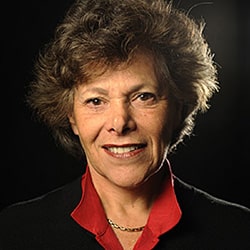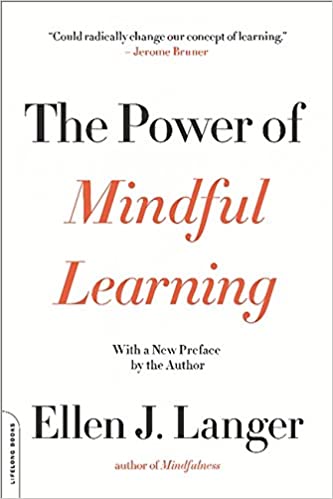The topic of mindfulness is likely one you’ve heard a lot about in recent years. But what does it mean to be mindful? And what is the connection between mindfulness and learning?
Dr. Ellen Langer is a social psychologist and a Harvard professor. She’s also a Guggenheim Fellow and the recipient of numerous awards and honors for her work on mindfulness that spans more than 40 years. She’s written 11 books and more than 200 research articles for general and academic readers on mindfulness. Her best-selling books include Mindfulness, The Power of Mindful Learning, On Becoming an Artist: Reinventing Yourself Through Mindful Creativity, and Counterclockwise: Mindful Health and the Power of Possibility.
In this redux episode of the Leading Learning Podcast, co-host Jeff Cobb talks with Ellen about what it really means to be mindful, the benefits that come with mindfulness, and ways you can encourage mindfulness in your own life and in the design of learning experiences.
To tune in, listen below. To make sure you catch all future episodes, be sure to subscribe via RSS, Apple Podcasts, Spotify, Stitcher Radio, iHeartRadio, PodBean, or any podcatcher service you may use (e.g., Overcast). And, if you like the podcast, be sure to give it a tweet.
Note: Dr. Langer has returned to the Leading Learning Podcast since this interview aired. Be sure to check out her more recent episode, “The Imprint of Mindfulness with Dr. Ellen Langer.”
Listen to the Show
Access the Transcript
Download a PDF transcript of this episode’s audio.
Read the Show Notes
[00:00] – Intro
What Is Mindfulness?
[02:38] – You’re known by many as the “mother of mindfulness” because of the valuable work you’ve done on the topic. How did you come to focus on mindfulness as an area of study?
In the 1970s, Ellen started studying mindlessness, which seemed to be pervasive—40 years of research has shown that virtually all of us are mindless almost all of the time.
Mindfulness isn’t meditation. Meditation is a tool to that may lead you to post-meditative mindfulness.
Mindfulness, as we study it, is a simple process of noticing new things, and, as you notice new things, that puts you in the present, that makes you sensitive to context and perspective, and it’s a process of engagement. So it feels good. And, as you’re noticing new things, you come to see, gee, you didn’t know it as well as you thought you did, and so then your attention naturally goes to it. So it’s very easy, and it’s the essence of what we’re doing when we’re having fun.
Ellen Langer
When it comes to mindfulness and learning, people have the mistaken notion of “no pain, no gain,” but, by being mindful, one can gain without pain. Ellen says she should have called what she studies creativity instead of mindfulness, but she didn’t because most people have a mindless notion of creativity. With creativity, too often the emphasis is on the final product. Mindfulness is a process, not a product. When you’re mindful, the product is usually better.
See Ellen Langer’s talk “Mindfulness over Matter,” in which she highlights many of the key points from her book, Mindfulness.
[06:18] – You’ve said that to be mindful is “to be confident and uncertain simultaneously.” What do you mean?
Everything is always changing. It looks different from different perspectives. When we think we know, we are being mindless and letting the past determine the present, rather than being in the present.
Mindfulness can lead to being less judgmental, and that leads us to be less concerned about other people judging us. After 40 years of research, Ellen has found that the simple act of noticing helps people live longer and feel good because they are engaged. People see you as more attractive and charismatic when you’re mindful, and the products you produce are better when you’re mindful.
If mindfulness leads to an understanding that knowledge is contextual or relative, and you can’t be certain about anything, that can be scary for some. People often pretend when they know they don’t know something that they think you might know. They hope they can get away with not knowing by pretending.
This is a personal attribution for uncertainty. What people need to do is make a universal attribution for uncertainty acknowledging that nobody knows. You can be confident and uncertain.
Partner with Tagoras
[10:43] – At Tagoras, we’re experts in the global business of lifelong learning, and we use our expertise to help clients better understand their markets, connect with new customers, make the right investment decisions, and grow their learning businesses.
We achieve these goals through expert market assessment, strategy formulation, and platform selection services. If you are looking for a partner to help your learning business achieve greater reach, revenue, and impact, learn more at tagoras.com/services.
Mindfulness and Learning
[11:17] – It seems there’s a mindfulness problem now with people not being open to learning. Do you feel that way?
When Ellen started her work over 40 years ago, nobody had heard about mindfulness. Today it’s hard to open a magazine or listen to a newscast without seeing or hearing the word mindful—even if they’re using the work incorrectly. So Ellen thinks the world is more and more open to mindfulness.
Mindlessness is certainly prevalent in many quarters. When you become mindful, you can take advantage of opportunities you otherwise wouldn’t notice and you can also avert bad outcomes.
Stress and Becoming More Mindful
[13:21] – If an individual wants to become a more mindful learner, are there practices you recommend?
There aren’t really “practices” for mindfulness (there are with meditation). Mindfulness is about being out in the world.
If you do nothing else, simply establishing a mindset for uncertainty will help you be more mindful.
When life is going well, mindfulness often doesn’t come up. When life isn’t working for us, people naturally seek solutions without being trained.
Stress, for instance, is a major problem for people all over the world. I get this question about how can people not be stressed when there’s so much to know? And the fact of the matter is there’s not much more to know than there was in the past. The difference is that people think that the more they know, the better they’ll do. And there’s no evidence for that. When you’re stressed, stress is mindless.
Ellen Langer
Stress relies on two things:
- The belief that something is going to happen.
- The belief that, when that something happens, it’s going to be awful.
To combat this stress, Ellen recommends you give yourself three reasons why this thing might not happen. Next, assume that it is going to happen. How might its happening actually be a good thing?
It all depends on how you choose to view the situation.
[15:43] – Ellen offers some exercises people can do to be more mindful.
- Every time you assume something is obvious, remember that it isn’t because everything looks different from different perspectives.
- Every time you negatively judge someone’s action, think how that behavior may have made sense from that person’s perspective.
- Walk out your door, and notice three things you didn’t see before. If you’re living with somebody, come back in the door and notice three new things about that person.
Keep taking the thing that you think you know and turn it inside out. Over time you’ll see that you didn’t know what you thought you knew. Then you’ll be naturally mindful, and you don’t have to work at it.
Mindfulness and Learning Experiences
[17:05] – What can people do to deliver or facilitate learning experiences that are more conducive to mindful learning? Can learning businesses help architect more mindful learning experiences?
Start with the choice of speakers at conferences. If you have a conference on X, having a leading authority on Y present would be interesting because people would wonder how X and Y are related. Thinking about that relationship would help them be more mindful.
When it comes to learning, people have the mistaken notion that there’s “no pain, no gain” and that one should be gaining all the time.
But learning is fun, so everything done at conferences should be fun—if it’s not, do it differently. When designing an event, rather than solely focusing on the transmission of information from one person to a group of people, make it fun for everybody.
[19:02] – Many organizations have a recognized body of knowledge or set of competencies that individuals need to master to get certified. How does mindfulness jibe with certification,competency, and bodies of knowledge?
How the certification process is designed will determine whether it works well or not. You can have a rigid set of rules and teach people to follow rules just as they’re laid out; that tends to be mindless. However, if you find a way to make each rule a little more tentative, you can encourage mindfulness.
When something is mindless, it tends to be rigid, and people follow it regardless of whether it makes sense in a particular context—the past dictates the present. Mindfulness is a looser, more conditional structure.
All learning should be fun. All learning should be conditional. And I think that the lifelong learners themselves probably would benefit from some of the research that people like myself do. We have a lot of research with older folk where we make them mindful. They live longer, they’re happier, and they’re healthier.
Ellen Langer
[21:48] – Ellen references the dramatic effects she found in her Counterclockwise study, which demonstrates how important context is and how so much about health, aging, and our negative views of those are learned behaviors.
She believes people should focus on adding more life to their years, rather than more years to their life.
Lifelong Learning Habits
[23:51] – What are your own lifelong learning habits and practices?
Other than following the advice for learning that was shared here, Ellen doesn’t really do much else.
As you get older, life gets easier because you see things differently. She suggests asking yourself, “Is it a tragedy or an inconvenience?” Often, when we’re younger, we react to things as if they’re tragedies when in fact they’re only inconveniences.
[25:45] – Wrap-up
Dr. Ellen Langer is a leading expert and pioneer in the field of mindfulness. She is the author of eleven books including Mindfulness, The Power of Mindful Learning, and Counterclockwise: Mindful Health and the Power of Possibility.
You can learn more about Ellen Langer’s work at ellenlanger.com.
To make sure you don’t miss new episodes, we encourage you to subscribe via RSS, Apple Podcasts, Spotify, Stitcher Radio, iHeartRadio, PodBean, or any podcatcher service you may use (e.g., Overcast). Subscribing also gives us some data on the impact of this particular part of our content strategy.
We’d also be grateful if you would take a minute to rate us on Apple Podcasts at https://www.leadinglearning.com/apple or wherever you listen. We personally appreciate reviews and ratings, and they help us show up when people search for content on leading a learning business.
Finally, consider following us and sharing the good word about Leading Learning. You can find us on Twitter, Facebook, and LinkedIn.
Episodes on Related Topics:




 Reflections on 2022
Reflections on 2022
Leave a Reply